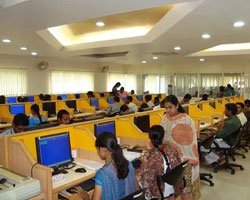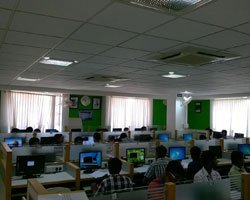The Department of Artificial Intelligence and Data Science is started in the year 2025




.The Department of Artificial Intelligence and Data Science is started in the year 2025
.The Department of Artificial Intelligence and Data Science is started in the year 2025
PEO 1-Core Competency: Graduates will design intelligent automation and data-driven decision- making techniques to develop sustainable solutions.
PEO 2-Professionalism: Graduates will integrate soft skills, and collaborate ethically in diverse professional and cross-functional teams.
PEO 3-Career Development: Graduates will pursue higher studies, research, and innovation to create sustainable AI solutions for societal and industrial challenge.
PO1-Engineering Knowledge: Apply knowledge of mathematics, natural science, computing, engineering fundamentals and an engineering specialization as specified in WK1 to WK4 respectively to develop to the solution of complex engineering problems.
PO2-Problem Analysis: Identify, formulate, review research literature and analyze complex engineering problems reaching substantiated conclusions with consideration for sustainable development. (WK1 to WK4)
PO3-Design/Development of Solutions: Design creative solutions for complex engineering problems and design/develop systems/components/processes to meet identified needs with consideration for the public health and safety, whole-life cost, net zero carbon, culture, society and environment as required. (WK5)
PO4-Conduct Investigations of Complex Problems: Conduct investigations of complex engineering problems using research-based knowledge including design of experiments, modelling, analysis & interpretation of data to provide valid conclusions. (WK8).
PO5-Engineering Tool Usage: Create, select and apply appropriate techniques, resources and modern engineering & IT tools, including prediction and modelling recognizing their limitations to solve complex engineering problems. (WK2 and WK6)
PO6-The Engineer and The World: Analyze and evaluate societal and environmental aspects while solving complex engineering problems for its impact on sustainability with reference to economy, health, safety, legal framework, culture and environment. (WK1, WK5, and WK7).
PO7-Ethics: Apply ethical principles and commit to professional ethics, human values, diversity and inclusion; adhere to national & international laws. (WK9)
PO8-Individual and Collaborative Team work: Function effectively as an individual, and as a member or leader in diverse/multi-disciplinary teams.
PO9-Communication: Communicate effectively and inclusively within the engineering community and society at large, such as being able to comprehend and write effective reports and design documentation, make effective presentations considering cultural, language, and learning differences.
PO10-Project Management and Finance: Apply knowledge and understanding of engineering management principles and economic decision-making and apply these to one’s own work, as a member and leader in a team, and to manage projects and in multidisciplinary environments.
PO11-Life-Long Learning: Recognize the need for, and have the preparation and ability for i) independent and life-long learning ii) adaptability to new and emerging technologies and critical thinking in the broadest context of technological change. (WK8)
PSO1-Computer Vision: Apply AI techniques to build intelligent systems for computer vision, image processing, deep learning, and natural language processing.
PSO2-Data Analytics and Decision Making: Apply data analytics techniques like statistical modeling, machine learning, and visualization to derive actionable insights and support decision- making
B.Tech - Artificial Intelligence and Data Science
Research work is a important part of every department at K.S.R. College of Engineering. Here’s the roundup of the research work – publications, patents, Grants and programs organized by the department.
Each department has connections with relevant industry professionals, tie-ups through MOUs with companies in order to facilitate Internships, Industry visits, Projects, Knowledge Sharing Expert Sessions by industry experts. This greatly helps us to bring in the industry-perspective into the courses being taught and a hands-on learning for the students.